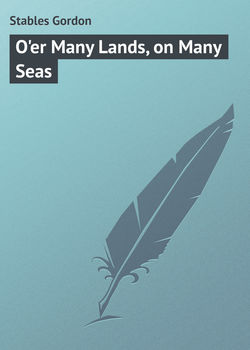Читать книгу O'er Many Lands, on Many Seas - Stables Gordon - Страница 4
Chapter Four
Оглавление“Still onward, fair the breeze nor rough the surge,
The blue waves sport around the stern they urge;
Far on the horizon’s verge appears a speck,
A spot – a mast – a sail – an armed deck.”
Byron.
“Well, Ben,” I said, “life must have been very pleasant to me then.”
“And isn’t it now, Nie? isn’t it now, lad? Look at the beautiful old place that you have around you – all your own; you ought to be thankful. Listen to the birds on this delightful morning, their songs mingling with the cry o’ the wind through the poplars. And, lad, you cannot draw a breath out on the lawn here, without inhaling the odour of honey, and the perfume of flowers.”
“You are quite poetic, Ben Roberts,” I replied.
“Quite enough to make the barnacliest old tar that ever lived feel poetic, Nie,” quoth Ben.
“Well, fill your pipe again, Ben.”
“Ha! ha!” laughed the old man, “fill my pipe again, eh? That means heave round with another yarn, eh?”
“Something very like it,” I said.
“Well,” said the captain, “an old man is to be forgiven if he does get a little bit gossiping now and then, and wanders from his subject, and I always was fond of a bit o’ pretty scenery, Nie – pretty bits like the old mill by the riverside down yonder.”
“And a bit of fishing and shooting, Ben?”
“Ay, lad. But memory is at this moment taking me back to one of the loveliest bits o’ woodland landscape in the world. What a poem our Robbie Burns could have written there! You were still the Niobe’s pet, but old enough now to be left at times without your sea-dad. Away miles and miles into the wooded interior of Africa, we were a good long distance south the Line, and just sitting down, me and my mates, to a snack o’ lunch on the banks of a roaring tumbling brook, where we’d been bathing. We’d had a smartish week’s shooting, and were thinking of returning to the ship the very next day.
“Our guns were lying carelessly enough at some little distance, when suddenly a branch snapped, and before any of us could have stood up to defend ourselves, had it been an unfriendly Arab, or a savage Somali, a dark skin pushed the branches aside and stood before us.
“It was our faithful Sweeba, the negro who had brought us the news of Zareppa’s intended attack on the night your poor father was killed, Nie.
“‘Sweeba, what on earth brings you here?’ says I.
“‘Commander’s orders,’ said Sweeba, saluting.
“Now Sweeba was always dressed when on board like a British sailor, but here he was almost as naked as the stem of a palm-tree.
“‘What have you done with your clothes, Sweeba?’ I asked.
“‘I expect he has pawned them,’ said little Brown, our purser’s clerk.
“‘I not can run muchee wid English clothes,’ Sweeba said modestly.
“‘And so you hid them in the bush, eh?’
“‘Ah! Massa Roberts,’ replied the negro, smiling; ‘you berry much clebber.’
“‘Well, and what are the commander’s orders?’
“‘You come back plenty much quick.’
“‘Ship on fire?’
“‘No, sah.’
“‘Anything happened to Nie?’
“‘No, sah. Nie and de monkey all right, sah.’
“‘Well, explain.’
“‘Only dis, sah, we goin’ to fight Arab dhow.’
“We were all up quick enough at this intelligence. We didn’t stop to finish our luncheon.
“‘Lead the way, Sweeba,’ I cried.
“And off went Sweeba through the forest, we following in Indian file. We didn’t take more of the game with us than we could easily carry, so the jackals had a good feed that night.
“It was a long and a rough road to travel. You know the style of thing, Nie; the dark dismal woods, the broad swamps, the hills and the wide stony uplands, where never a thing lives or thrives, bar the lizards and a few snakes, and then last of all the mangrove forests. Our anxiety to get back made us hurry all the more. We made forced marches, and burned but two camp fires ere we reached the coast.
“The ship we had left lying at anchor in a little wooded creek. We returned to find it gone.
“‘Massa, massa; we too late,’ cried Sweeba. ‘Now de Arab men come quick and kill us all for true.’
“‘Where is the nearest village, Sweeba?’
“‘Long way, sah; long way, and no good. Dey kill Englishman. No gib mooch time to tink.’
“‘Well, we’re in a fix, I think,’ I said.
“‘Not a bit of it,’ cried a cheery voice close behind us; and looking round there stood little Midshipman Leigh, of the starboard watch. The young rascal had heard us coming, and hidden his boat among the trees, making his men lie close, as he expressed it, to see how we’d look.
